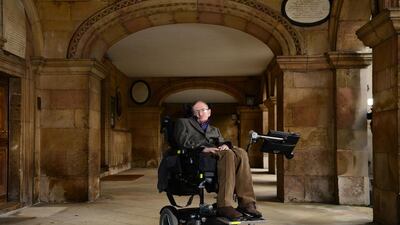If you’re up for a stiff intellectual challenge, then renowned theoretical physicist Stephen Hawking has just the brain you will want to pick – your own.
As presenter and narrator of Genius by Stephen Hawking – a six-part science series starting today on National Geographic HD – the professor challenges ordinary people to think like the greatest scientific minds in history, to solve some of humanity's most enduring questions.
“Do you need to be a genius to answer the big questions?” asks Hawking, who is also a cosmologist, author and director of research at the Centre for Theoretical Cosmology at the University of Cambridge.
"I'm very pleased to be back on the air with Genius, a project that furthers my lifelong aim to bring science to the public," he says.
“It’s a fun show that tries to find out if ordinary people are smart enough to think like the greatest minds who ever lived. Being an optimist, I think they will.”
Hawking himself, of course, is anything but ordinary.
Despite the motor neuron disease that gradually paralysed him over the decades, the 74-year-old’s mind has danced circles around the universe, with books and papers on gravitational singularity theorems, black holes, cosmology and the many-worlds interpretation of quantum mechanics.
His life story inspired the 2014 biographical film The Theory of Everything and its star, Eddie Redmayne, won an Academy Award for his portrayal of the young scientist.
Other appearances by Hawking in popular culture include a guest role Star Trek: The Next Generation (as a holographic simulation of himself), cartoon portrayals in The Simpsons and Futurama, and an appearance on geek-friendly sitcom The Big Bang Theory.
As an author, his many books have made his rarefied, brain-boggling science accessible and popular around the globe – A Brief History of Time (1988) spent a record-breaking 237 weeks on the best-seller list of Britain's Sunday Times. Nowadays, the father-of-three can only communicate using a single cheek muscle attached to a speech-synthesiser – but this has neither limited his outreach nor dimmed his passion for bringing science to the masses.
Through the use of large-scale experiments and extraordinary demonstrations, Genius by Stephen Hawking decodes the mysteries of evolutionary biology, astrophysics and quantum mechanics, tackling some of humanity's biggest questions.
In each episode, Hawking encourages three people with curious minds to use their own intellect to learn what humanity’s most notable thinkers have discovered about the greatest scientific mysteries over the centuries. Episodes include:
• Can We Travel in Time? This fascinating journey of discovery features DeLoreans, atomic clocks, a giant black hole and a large swath of New York City.
• Are We Alone? What is the likelihood of alien life in the universe? Watch the team have their minds blown in a way they were never expecting.
• Why Are We Here? Can the team work out why anything exists? Hawking takes them down a rabbit hole of profound realisations, helping them think like philosophers as much as scientists.
• Where Did the Universe Come From? Hawking uses racing cars, ice-skaters, balloons and running tracks to fire up the imagination.
• What Are We? Self-assembling machines, light-up bacteria and the world's first physical demonstration of evolution in action revolutionise the trio's view of life.
• Where Are We? Can the trio measure the earth, the solar system and even the universe – and determine our true place in the cosmos?
For science lovers, this will be the sweetest of brain candy. And for the uninitiated, it is the perfect introduction.
So buckle up your cerebellum for a journey that spans the breadth of human history, from ancient Greece, where Eratosthenes first calculated the Earth’s circumference, to more recent thinkers such as Edward Hubble, who revealed and set down the distances between Earth and other galaxies.
“The series puts complex scientific concepts into easily digestible layman’s terms,” says Hamish Mykura, executive vice president of programming and development for National Geographic Channel.
“The experiments are spectacular and illustrate some of the most important ideas from some of the greatest minds in history in highly engaging ways.
“My hope is that Stephen Hawking and this series encourage more minds around the globe to engage with the scientific challenges of tomorrow.”
• Genius by Stephen Hawking airs at 9.50pm tonight on National Geographic HD
artslife@thenational.ae

